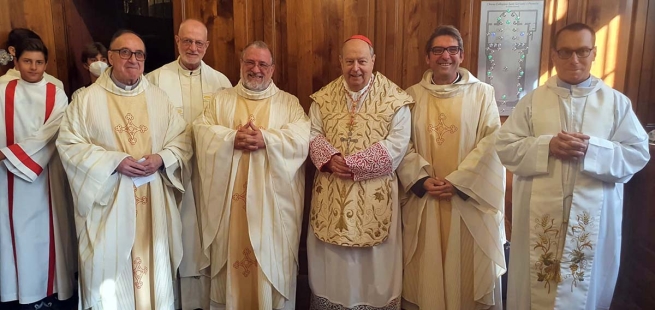As narrated by Giulio Spini in his book I Salesiani in Valtellina, it was Friday, September 24, 1897, the day the first Salesians arrived to the city by train, having departed from Milan. Waiting for them were Mayor Toccalli, Archpriest Stoppani, Father Miotti, and another canon of the collegiate church. From the train emerged, among others - as Giulio Spini again describes - "the group of travelers expected by the local dignitaries who moved to meet them: Fr. Federico Moratti, appointed Rector, Fr. Luigi Rocca, then Economer General of the Salesian Congregation, the cleric Pastorino Paolo and the Salesian coadjutor Rodda Francesco, sent by Fr. Rua so that at the request of the city’s priests they would 'gather the abandoned sons of the people, so that they might be educated in a Christian manner and instructed in the elementary schools to later learn a trade in the Institute itself' and also follow the other young people."
The day after they arrived in town, the Salesians celebrated their first Mass in the little church of San Rocco, whose rectory was entrusted to them.
"125 years later," reflects Fr. Giacinto Ghioni, current Rector of the Salesian Institute in Sondrio, "we are still here today trying to interpret the needs, to meet their requests, to sense the hopes of the youth who are increasingly in need of being protected and helped."
As Fr. Ghioni affirms, many things have changed in this time: "Fields of action have changed, educational styles have evolved, spaces for action have opened up in the area of volunteering. There has been a rediscovery of the vocational dimension inherent in every life project... On the other hand, the Valley continues to be long and wide, travel times high, school facilities concentrated in the capital; the falling birth rate impoverishes families, children on the street have been followed by those left to themselves in the company of the smartphone..."
In this context, the Salesians have tried to keep up with the times, while remaining faithful to their charism, and this allows them, stresses Fr. Ghioni, "to look to the future with renewed impetus, while knowing that the educational challenge will become increasingly difficult and complex. Is it presumptuous to believe this? The many good people who grew up in the shadow of San Rocco encourage us to believe in this dream, if we know how to adopt the heart and courageous inventiveness of Don Bosco's charity."
The Salesian work "San Rocco" in Sondrio today consists of an oratory and youth center, a public church, multi-purpose spaces for the artistic and cultural formation of young people, and a large boarding school that now houses dozens of boys and girls from the most distant and remote villages of Valtellina.
https://www.infoans.org/en/sections/news/item/16310-italy-125-years-of-salesian-presence-in-sondrio#sigProId07507281f8



